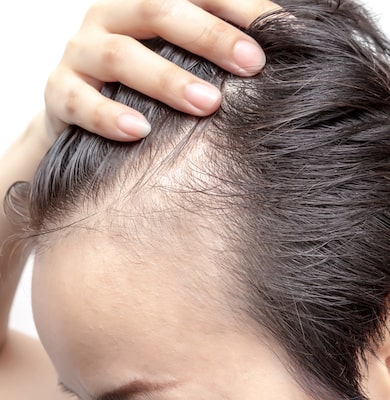Hair Loss Related to Stress – How to Combat This Condition
The continuing concerns about COVID-19 and the new worries about monkeypox have contributed to a good amount of stress among the public. These concerns are in addition to the daily worries everyone has about family, friends, and politics. Besides having a mental impact on people, these worries can lead to sudden stress which can impact the appearance of the hair on the scalp. As the sudden stress level of a person increases, the cortisol level will also increase, and this can lead to hair loss.
Not sure how to handle hair loss related to sudden stress? Keep reading to learn more about how to address stress that is causing a loss of hair on the scalp.
Hair Loss and Cortisol Levels
 When a person is feeling a great deal of stress, the adrenal glands produce a hormone that is known as cortisol, The stress can make the cortisol signal the hair follicles to shift out of the growth phase and into catagen (which can be described as a transition phase). This shift can result in the hair falling out and hair loss due to sudden stress is known as Telogen Effluvium.
When a person is feeling a great deal of stress, the adrenal glands produce a hormone that is known as cortisol, The stress can make the cortisol signal the hair follicles to shift out of the growth phase and into catagen (which can be described as a transition phase). This shift can result in the hair falling out and hair loss due to sudden stress is known as Telogen Effluvium.
It can be said that stress impacts everyone differently so it is important to understand that stress can be sudden and impactful or the results of stress on the hair can also be cumulative.
In order words, daily tasks and to-do lists can have a slow impact on the shedding of hair. On the hand, major or acute stress can result in a significant amount of hair loss due to an unexpected event or a traumatic injury. These types of events can cause a large shift in the neurochemical or hormonal balance of the body. The changes in stress hormones can send a signal that causes a large amount of hair follicles to prematurely change from the growth phase of hair (anagen) to the resting phase (telogen) of the hair growth cycle.
The loss of hair can occur as a thinning of the scalp hair that makes it have a weaker structure that can also be experienced as hair breakage.
Hair Loss Related to Stress – How to Prevent It
While it seems obvious to say that learning to reduce your stress by coping with stressful situations in different ways can reduce hair loss, it is true that this is a key element to combating hair loss due to stress.
If a stressful event has occurred, the diffuse hair loss will normally not be visible for anywhere from two to three weeks to two to three months. The hair loss can be seen as thinning hair on the scalp as well as the shedding of hair during routine hair care routines such as combing or shampooing the hair. Once the hair loss starts to become noticeable, patients should contact a doctor in order to address the loss of hair and to make a treatment plan to keep the existing hair on the scalp.
Once the cause of the shedding, also know the event producing enough stress to result in shedding, is no longer an active event or is no longer present in the life of a patient, the diffuse hair loss/shedding of the hair will start to slow done. It can even disappear completely, but this can take anywhere from six to eight months.
Hair Loss Related to Stress – Is Treatment Necessary for the Condition?
When it comes to the condition known as Telogen Effluvium, the hairs on the scalp that are lost during the shedding process are pushed out by new hair that is growing underneath them. In fact, the act of the hair falling out serves as a signal that the regrowth of hair has started for the patient. There might be times when the doctor will suspect that the hair loss is being caused by some sort of genetic deficiency or medication. However, Telogen Effluvium is normally considered to be a self-contained condition that will not require any further treatment on the part of the doctor.
The loss of hair can be caused by stress, genetics, or other factors such as a repeated pulling of the hair due to stress or OCD. It is important to contact an experienced and board-certified doctor who specializes in the treatment of hair loss. The doctor will examine the scalp to determine the current amount of hair loss and to also examine the scalp to identify the reason for the hair loss. It is also important for the doctor to gather more information about the medical history of the person to learn if the patient is genetically inclined to experience hair loss
Once the reason for the hair loss has been identified, as well as the extent of the loss of hair that has occurred on the scalp by the time of the office visit, the doctor can explain the reason for the loss of hair to the patient and make a plan to treat the scalp of the person.